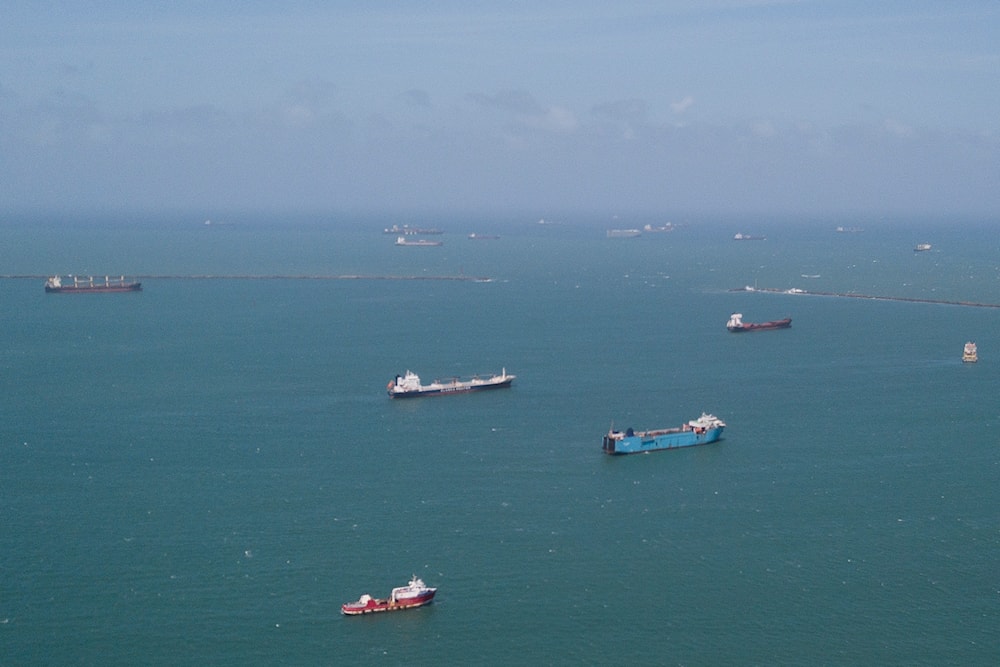Panama denies adjusting canal tariffs for US vessels: Statement
Panama denies the State Department's claim that it agreed to waive fees for US government ships using the canal.
-

Cargo ships wait to transit the Panama Canal in Colon, Panama, on February 4, 2025. (AP)
The Panama Canal Authority denied Wednesday that it would allow US government vessels to transit the interoceanic waterway for free, as the US State Department announced earlier.
In a statement, the agency said, "The Panama Canal Authority, which is empowered to set tolls and other fees for transiting the canal, reports that it has not made any adjustments to them."
On Wednesday, the United States announced that, after significant pressure from President Donald Trump, its government ships would be permitted to pass through the Panama Canal without charge.
In a post on X, the State Department said that the "US government vessels can now transit the Panama Canal without charge fees, saving the US government millions of dollars a year."
U.S. government vessels can now transit the Panama Canal without charge fees, saving the U.S. government millions of dollars a year. pic.twitter.com/G4gV2mHu7O
— Department of State (@StateDept) February 6, 2025
This marked the first public disclosure of commitments previously hinted at by US Secretary of State Marco Rubio, who alleged that Panama had made concessions during their discussions on Sunday. He argued that it was unfair for the United States to be in a position to defend the vital waterway and also to be charged for its use.
Read next: US Republicans introduce bill allowing talks to procure Panama Canal
Trump had refused to rule out force to seize the canal since winning the November US election, through which 40% of the US container traffic passes.
Trump and Rubio have raised alarms about Chinese investments, particularly in ports at both ends of the canal, cautioning that Beijing might restrict access to the waterway in a crisis. However, Panama has firmly denied Trump’s persistent assertions that China is involved in operating the canal.
However, Panama has taken steps to address US concerns. Following his discussions with Rubio, President Jose Raul Mulino announced that Panama would not renew its membership in the Belt and Road Initiative, China’s flagship infrastructure development program.
On Monday, Rubio told reporters that his talks with Mulino were "respectful" and that the visit was "going to achieve potentially good things that assuage concerns we have." However, Trump argued that he was not satisfied, although he acknowledged that Panama had "agreed to certain things."
The United States and Panama are scheduled to hold new talks on Friday to discuss the canal.
Trump's threats against the Panama Canal
Trump slammed on December 22, 2024, what he called unfair fees for US ships passing through the Panama Canal and threatened to demand Washington gain control over the waterway.
Trump also shed light on what he described as China's growing influence around the canal, which he considers a threat to US interests since US businesses depend on the channel to transfer goods between the Atlantic and Pacific oceans.
On his Truth Social platform, Trump said, "Our Navy and Commerce have been treated in a very unfair and injudicious way. The fees being charged by Panama are ridiculous," adding, "This complete 'rip-off' of our Country will immediately stop."
It is worth noting that the Panama Canal, completed by the United States in 1914, was returned to Panama through a 1977 agreement signed by US President Jimmy Carter, and in 1999, Panama took full control of the canal.
Trump said "It was solely for Panama to manage, not China, or anyone else," adding, "We would and will NEVER let it fall into the wrong hands!"
The president-elect expressed his concerns over Panama's handling of the Panama Canal, in terms of what he described as "the secure, efficient and reliable operation" of the channel, warning that he would feel obliged to "demand that the Panama Canal be returned to us, in full, and without question."

 4 Min Read
4 Min Read










